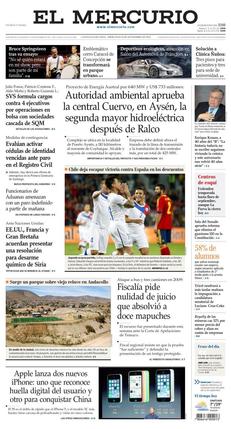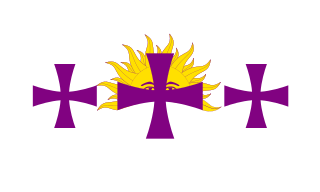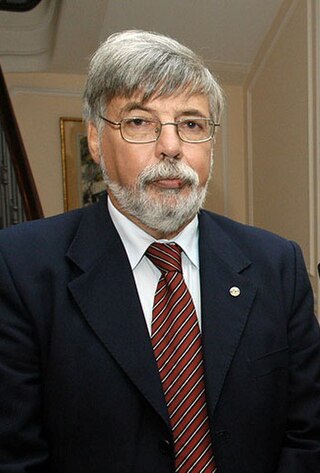Related Research Articles

El Mercurio is a Chilean newspaper with editions in Valparaíso and Santiago. El Mercurio is owned by El Mercurio S.A.P., which operates a network of 19 regional dailies and 32 radio stations across the country.

Castilleja de la Cuesta is a town and municipality in the province of Seville, in the autonomous community of Andalusia, Spain.

Hispanidad is a Spanish term describing a shared cultural, linguistic, or political identity among speakers of the Spanish language or members of the Hispanic diaspora. The term can have various, different implications and meanings depending on the regional, socio-political, or cultural context in which it is used.
Diario de Hoy is a morning newspaper in El Salvador. It is published in San Salvador and circulates throughout the country. It also has an open online edition. The director of El Diario de Hoy is Enrique Altamirano Madriz, its executive director is Fabricio Altamirano and the editor is Eduardo Torres.
The Premio Planeta de Novela is a Spanish literary prize, awarded since 1952 by the Spanish publisher Grupo Planeta to an original unpublished novel written in Spanish. It is one of about 16 literary prizes given by Planeta.
Rebelión is a nonprofit news site, started in Spain at the end of 1996 by a group of journalists. It contains scientific and opinion articles covering topics such as current affairs, free knowledge, culture, ecology, economics, and resistance to globalization. Texts by, and translations into Spanish from, authors such as Heinz Dieterich, Noam Chomsky, Marta Harnecker, Eduardo Galeano, José Saramago, Gabriel García Márquez, Julio Anguita, Vicenç Navarro and Ralph Nader have been included in Rebelión.

Eduardo Martínez Celis was a Mexican journalist, author and politician. Pseudonym: Abbé Sieyès

El Rostro de la Venganza is a Spanish-language telenovela produced by United States–based television network Telemundo Studios, Miami. David Chocarro, Elizabeth Gutiérrez and Cynthia Olavarria starred as the protagonist, with the special participation of Maritza Rodríguez, while Saúl Lisazo and Marlene Favela starred as the antagonists.

Edison Eduardo Bonomi Varela was a Uruguayan guerrilla member and politician of the Movement of Popular Participation – Broad Front. He served as Minister of Labour and Social Welfare from 2005 to 2009, and as Minister of the Interior from 2010 to 2020. Since February 15, 2020, he served as Senator of the Republic.

Senda de gloria is a Mexican telenovela produced by Ernesto Alonso for Televisa in 1987. The telenovela recreates historical events in Mexico between 1916 and 1939. It starred Eduardo Yáñez, Julieta Rosen, Ignacio López Tarso, Blanca Sánchez, Roxana Chávez and Anabel Ferreira.
The following lists events that happened during 1970 in Chile.

The 1917 Guatemala earthquakes were a sequence of tremors that lasted from 17 November 1917 through 24 January 1918. They gradually increased in intensity until they almost completely destroyed Guatemala City and severely damaged the ruins in Antigua Guatemala that had survived the 1773 Guatemala earthquakes.

José Miguel Vilar-Bou is a contemporary Spanish novelist, short story writer, and journalist, specializing in horror fiction, science-fiction and fantasy. His work has been awarded with several prizes in literary competitions. His novel Alarido de Dios [The Cry of God] was a finalist for the Awards Celsius 2010 and his short story "El laberinto de la araña" ["The Spider's Labyrinth"] received in the same year the Nocte Award for the best Spanish horror story. In the Spanish Historia natural de los cuentos de miedo [Natural History of the Weird Tales], because of the "expeditious and accurate in its proposal", critic José L. Fernández Arellano mentioned this author's story "La luz encendida" as leading among the young writers' of the genre of horror in Spain.

Rafael Honorio Caupolican Ovalles Colmenares was a controversial Venezuelan writer. He belonged to the avant-garde period of the sixties and was influenced by French Surrealism and American Beatnik.
El Porvenir is an independent daily newspaper based in the city of Monterrey, Nuevo León, founded in 1919.
El señor doctor is a 1965 Mexican comedy film directed by Miguel M. Delgado and starring Cantinflas, alongside Marta Romero and Miguel Ángel Álvarez.

Clotilde González de Fernández was an Argentine educator, piano teacher, and writer. She was a pioneer of education in Misiones Province, having taken the initiative to establish the first secondary schools of the then "Territorio Nacional de Misiones". She was the promoter of a popular movement that achieved through the National State the creation of the normal schools in 1909, the National School in 1917, the School of Arts and Crafts in 1924, and the first musical institute in 1918, in Posadas.

Prensa Ibérica Media, S.L., or simply Prensa Ibérica, is a Spanish mass media company owned by Javier Moll. It primarily owns regional newspapers.

Pedro Gros or Pedro Gross was a Spanish painter and sculptor of contemporary impressionist symbolism. He was also a jeweler, an actor, and a businessman. He created the first doll brand in Spain and worked as a professor of fine arts, toys and crafts in the Americas.
References
- ↑ Hopke, Jill E. (2012-07-19). "Water Gives Life: Framing an Environmental Justice Movement in the Mainstream and Alternative Salvadoran Press". Environmental Communication. 6 (3): 365–382. Bibcode:2012Ecomm...6..365H. doi:10.1080/17524032.2012.695742. ISSN 1752-4032. S2CID 143081747.
- ↑ http://netorivasnet.blogspot.com/2013/05/no-han-visto-diario-latino-mirenlo.html ¿No han visto el nuevo diario Latino? Mírenlo
- ↑ http://nuevaweb.diariocolatino.com/resena-historica-de-co-latino/ Archived 2014-09-17 at the Wayback Machine Reseña histórica de Co Latino
- ↑ "El Salvador's Co Latino newspaper wins European prize for freedom of expression". Knight Center for Journalism in the Americas. Retrieved 2020-04-14.